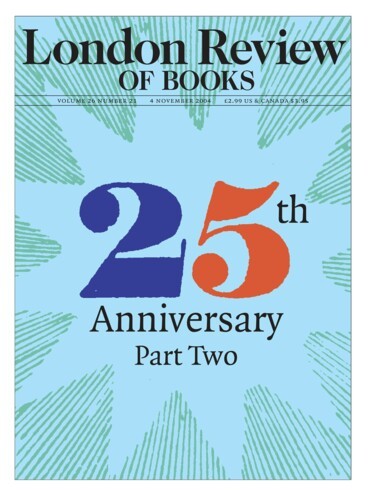So Robert Kilroy-Silk, the fallen idol of daytime TV, has failed to win the backing of a majority of the United Kingdom Independence Party’s local chairmen in his bid to replace Roger Knapman as Ukip’s leader. The party’s highest-profile MEP isn’t going to let a ‘farcical’ straw poll stand in his way, however. He has accused Ukip of being run by a ‘cabal’ headed by Nigel Farage, the Ukip MEP for the South-East, and says it’s time for the party to grow up and get serious. Suggesting that the chairmen were subject to ‘Mugabe-style’ intimidation from the cabal, Kilroy-Silk has demanded a poll of the party’s entire membership – all 28,000 of them – and said that for him to keep quiet now ‘would be a fraud on the British electorate’. Judging from the disproportionate amount of media coverage he’s getting (even from the LRB; at least it’s only in Short Cuts), you could be forgiven for thinking there ought to be a referendum on the matter.
A more interesting poll would unearth how many people think Kilroy-Silk already is the leader of Ukip, since there’s little doubt that his tanned presence on the campaign trail, aided by other fading celebrity ghouls such as Joan Collins, is largely responsible for the party’s half-decent performance in the European elections in June. Alan Sked, the LSE lecturer who founded the party in 1993 and left it in despair in 1997, has described it in its current form as a bunch of ‘aged xenophobes’, ‘meaningless fuddy duddies with very little intelligence’. A freelance canvasser I encountered in June had this to say: ‘Did you know that the Women’s Institute – you know, these ladies in Hampstead – are not allowed to sell their marmalade because of EEC regulations? It’s illegal! Can you believe it? I do hope you’re all members of this new party.’ To take the mistakes in reverse order: Ukip’s been around for more than a decade; the EU hasn’t been the EEC since 1967; and the Hampstead WI isn’t prevented by EU regulations from selling homemade marmalade. As it happens, neither I nor any of the people I was with is now or ever has been a member of Ukip, though he wasn’t to know that.
He could have made an educated guess, however. We were all under 30, most of us were women (memorably ticked off by the Ukip MEP Godfrey Bloom for not cleaning behind the fridge), and not all of us were white: demographically unpromising candidates for membership in a party which is anyway tiny – an order of magnitude smaller than Labour or the Tories, its membership amounts to 0.06 per cent of the electorate. The amateur Ukip enthusiast may have meant only that he hoped we were among the 2.7 million people who voted for the party (6.2 per cent of the electorate) – a hundred times more probable, but still pretty unlikely.
Wishful thinking is a hallmark of Ukip, and they’re self-importantly noisy enough to make it look as if they matter more than they do. Kilroy-Silk’s bluster about the possibility of Ukip turning into a plausible party of power has been inflated in part by what Nicholas Soames, the Conservative defence spokesman, called the ‘fucking awful’ by-election result in Hartlepool, where Ukip narrowly beat the Tories to third place by 3193 votes to 3044 (10.18 per cent to 9.71). The battle for the minority right-wing vote was only ever a sideshow, however: what’s worth noticing about Hartlepool is that, despite an 18.82 per cent swing to the Lib Dems, the government hung onto what should always have been a safe Labour seat with 12,752 votes.
It doesn’t make much difference who the official leader of Ukip is: most people inside the party seem to agree that Farage pulls the strings, and most people outside identify it with Kilroy-Silk. This must irritate Farage no end, and might go some way towards explaining why he’s so opposed to the man who’s almost single-handedly responsible for his party’s current prominence. Were Kilroy-Silk to leave Ukip, as a nervous Knapman has proposed he should, to ‘plough his own furrow’ (a phrase designed no doubt to appeal to the Countryside Alliance), the party’s temporarily bloated support and celebrity would surely go with him, much as the Referendum Party (remember them?) withered after the death of James Goldsmith.
Wrinkly glitz aside, the substantial electoral significance of Ukip is to decoy voters away from the Tories and lure Michael Howard’s party towards the right, not only weakening the support of an already enfeebled opposition but handing the centre ground to Labour. Perhaps this is what Farage means when he says he’s worried by Kilroy-Silk’s ‘left-wing’ agenda. Tony Blair should be delighted. If Kilroy-Silk is serious about getting his hands on some real political power (perish the thought that he might be in the game only because he can’t bear not to be on TV), perhaps he should make a few clandestine approaches to the party he left twenty years ago. Who’s to say that a grateful prime minister wouldn’t wangle him a job – on the EU Commission, perhaps, when the recently elevated former MP for Hartlepool steps down.
Send Letters To:
The Editor
London Review of Books,
28 Little Russell Street
London, WC1A 2HN
letters@lrb.co.uk
Please include name, address, and a telephone number.

